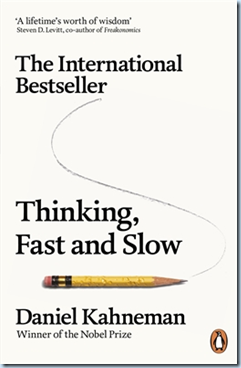When rail fares go up - like the recent announcement - there’s normally massive media coverage. So the idea “trains are expensive” becomes highly salient and very vivid. Here’s another example, from the Daily Telegraph, which points out that planes are cheaper than trains on half of the surveyed routes in the UK - that’s pretty vivid. (although also in the article, much less prominent, is the following quote, “Despite soaring fuel prices, travelling by car proved cheaper than taking the train on 16 of the 50 journeys.” Which is a great example of another behavioural economics technique, notably framing - because what the data actually says is that train is cheaper than car for 34 out of 50 journeys. Or put it another way, train is cheaper than car on 68% of the journeys in the survey).
So, thinking about our own journeys, what we mostly don’t do is analyse the comparative costs of using different modes for a particular trip. Instead, those vivid and salient examples of expensive train travel pop up because they are readily available to our memory, hence the “availability heuristic:” a rule of thumb we use when faced with a decision.
 As Daniel Kahneman, the godfather of behavioural economics, shows in his book Thinking, Fast and Slow, when we are asked a difficult question we mostly don’t analyse the data using the rational part of the brain. Instead, we often allow our instinctive "gut reaction" to answer a related, simpler question. In this case we might just skip the difficult stuff and ask ourself “why don’t I just use the car?” Understandable when the alternative is going through the complicated and energy-sapping analysis of rail fare options (MoneySavingExpert can help out here). Far easier to let our availability heuristic do the mental shortcut and conclude that train travel is expensive, so we’ll go by car. Even more likely if high-profile media coverage triggers an "availability cascade", a self-sustaining chain of events which leads to the overestimation of probabilities – which in this case would be “going by train is more expensive.”
As Daniel Kahneman, the godfather of behavioural economics, shows in his book Thinking, Fast and Slow, when we are asked a difficult question we mostly don’t analyse the data using the rational part of the brain. Instead, we often allow our instinctive "gut reaction" to answer a related, simpler question. In this case we might just skip the difficult stuff and ask ourself “why don’t I just use the car?” Understandable when the alternative is going through the complicated and energy-sapping analysis of rail fare options (MoneySavingExpert can help out here). Far easier to let our availability heuristic do the mental shortcut and conclude that train travel is expensive, so we’ll go by car. Even more likely if high-profile media coverage triggers an "availability cascade", a self-sustaining chain of events which leads to the overestimation of probabilities – which in this case would be “going by train is more expensive.” So here’s
a behavioural economics guide to cheaper travel:
First, put your heuristics on hold – especially your availability heuristic;Second, make sure you ask the right question (eg: what is the cheapest and most convenient way to accomplish this journey?);
Third, ensure that you answer the same question, rather substitute an easier one that springs to mind.
You might be surprised by the answer…..
Great post! Hits the nail on the head
ReplyDeleteThat is really very surprising news that trains can be cheap but really train is really affordable as compare too car as fuel price is been increasing enormously day by day.
ReplyDeleteTotal cost of rail in 2009/10 = £12.7bn Passenger miles undertaken = 20.5billion
ReplyDelete(source dft)
Therefore cost per mile 62pence.
So yes rains can be cheap when you get a nice fare. But in aggregate it's not so clear.